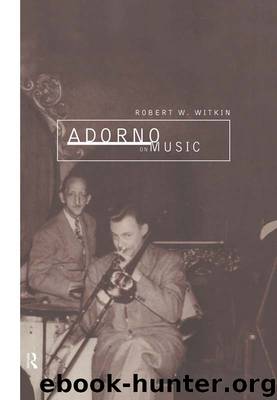Adorno on Music by Witkin Robert W

Author:Witkin, Robert W.
Language: eng
Format: epub
ISBN: 978-1-136-21544-5
Publisher: Taylor and Francis
Individuated agency
This ever-strengthening constructivism is a feature of Goffmanian sociology but Goffman remains committed to the construction of the self and the defence of its territories. Ethnomethodology represents a more radical constructivism in which the problems of the construction of self are displaced by the micrological sphere of the construction of social agency (Garfinkel 1967). If social action is inter-actional, social agency is intra-actional. By intra-action is meant the micrological processes in which subjects draw on local materials, on members’, understandings, practises, routines, topics, resources, on variegated experiences in different contexts, in putting together the agency and sensibility — the understanding — with which action gets done. In Durkheim’s model there is a unitary and coherent society — a transcendental system — which gets into individuals through socialisation and generates a unitary selfhood that corresponds to it. In Goffman’s model, society is made up of multiple systems that are only partially continuous with one another and which give rise to multiple selves corresponding to the variety of role contexts, a multiplicity for which each individual is a ‘holding company’. In the ‘individuated agency’, model, by contrast, attention shifts from the macro-structure to its constitutive elements, each element identified by its functional character, as an action being brought off- an ‘opening’, a ‘closing’, a ‘diminishing’, or whatever -that is, each action or event-element is identified by what it ‘does’, or what it ‘affords’, and each structure or organisation is constituted by actors as integral to the business of bringing off actions and making sense.
These functions become the building blocks with which the sociologist (re)constructs the ‘social agency’, and sensibility that might account for the subject’s actions and choices in a given context. The subject, here, can no longer be identified with the individual as a unitary structure or even the individual as a multiplicity of selves. Rather, the focus is upon the activity of the subject together with the subject’s local understandings and accountings — accountings which are integral to the bringing off of that activity. Typically, the analyst might focus upon an event of some kind, a doing or an account, and seek to disclose the sense-making activities of the subject through which the event or doing is brought off or its meaning constituted. Each event-element can be referred to the functional ordering which is brought about by its activities and in and through which it makes sense. But that construction will not do for the next event-element; the process must begin again.
For my purposes I will offer the following somewhat idiosyncratic conceptualisation: a complex structure or sequence of action is broken down into what are seen to be significant event-elements. Beginning with an event — for example, a question asked — an attempt is made to construct a ‘social machinery’, through which the subject hearing the question might constitute its meaning. The process can then begin again with the next element. It is a continuous process of structuration and de-structuration, beginning and ending with the event-elements.
Consider the following situation, described by Wootton (A.
Download
This site does not store any files on its server. We only index and link to content provided by other sites. Please contact the content providers to delete copyright contents if any and email us, we'll remove relevant links or contents immediately.
Aircraft Design of WWII: A Sketchbook by Lockheed Aircraft Corporation(32274)
The Great Music City by Andrea Baker(31902)
Call Me by Your Name by André Aciman(20467)
The Secret History by Donna Tartt(19002)
The Art of Boudoir Photography: How to Create Stunning Photographs of Women by Christa Meola(18603)
Shoot Sexy by Ryan Armbrust(17713)
Plagued by Fire by Paul Hendrickson(17391)
Portrait Mastery in Black & White: Learn the Signature Style of a Legendary Photographer by Tim Kelly(16993)
Adobe Camera Raw For Digital Photographers Only by Rob Sheppard(16957)
Photographically Speaking: A Deeper Look at Creating Stronger Images (Eva Spring's Library) by David duChemin(16671)
Ready Player One by Cline Ernest(14618)
Pimp by Iceberg Slim(14464)
Bombshells: Glamour Girls of a Lifetime by Sullivan Steve(14039)
The Goal (Off-Campus #4) by Elle Kennedy(13640)
Art Nude Photography Explained: How to Photograph and Understand Great Art Nude Images by Simon Walden(13022)
Kathy Andrews Collection by Kathy Andrews(11795)
The Priory of the Orange Tree by Samantha Shannon(9045)
The remains of the day by Kazuo Ishiguro(8949)
Thirteen Reasons Why by Jay Asher(8874)
